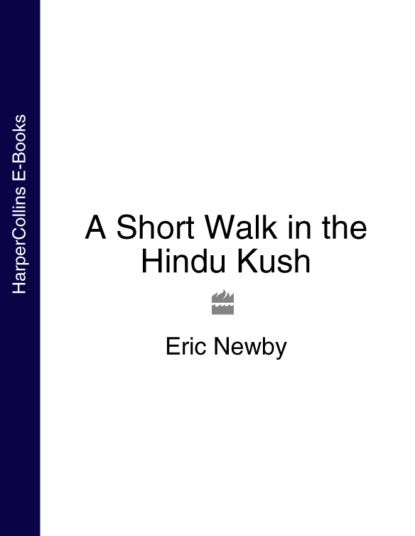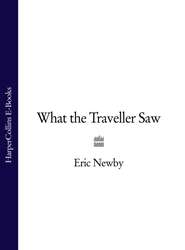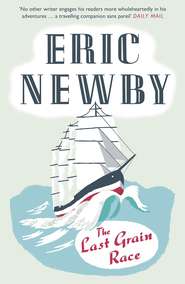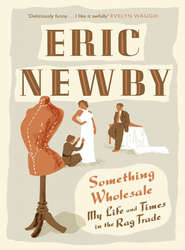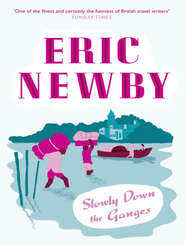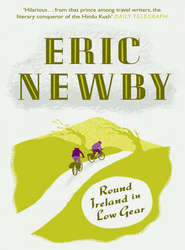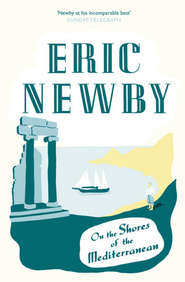По всем вопросам обращайтесь на: info@litportal.ru
(©) 2003-2024.
✖
A Short Walk in the Hindu Kush
Автор
Год написания книги
2018
Настройки чтения
Размер шрифта
Высота строк
Поля
We were ninety kilometres from Horasan. Finally he agreed to continue to the next town, Sarikamis, and return the following day.
But the next day had brought disaster and tragedy. Towards evening we had arrived at Bayazid. ‘Fortress town on the Persian Frontier; close to Ararat on the great caravan road from Tabriz to Erzerum with the Serail of Ezak Pasha on a rock.’ The ancient guide to Turkey had made it sound romantic, but the splendours of the caravan road had departed and several earthquakes and countless massacres had made of Bayazid a sad, shanty town without a skyline, full of soldiers clumping down the single street in great boots, and debased-looking civilians in tattered western suits and cloth caps.
Determined to sleep in Persia we set off at breakneck speed towards the east. Night was coming on. The road was deserted; it ran through an arid plain; to the right were low mountains with, close under them, the black tents of the nomad people. All day, in the upland country about Ararat, we had seen bands of them on the march, driving their bullocks loaded with tent poles and big tribal cooking pots; vicious-looking donkeys with pack saddles, flocks of goats and sheep; the men and women on foot, the women in full red skirts with a sort of black surcoat and black balaclavas, the younger ones in pill-box hats and plaits, the boys wearing lambskin caps, the smallest children sitting, on white cushions, astride lean little horses; all moving westward along the line of the telegraph poles, each family enveloped in its own cloud of dust.
Less than a mile from the Customs House on the Turkish side, travelling in the last of the light, something dark loomed up on the road in front. Wanda shouted but Hugh was already braking hard. There was going to be an accident and it was going to take a long time to happen. I wondered whether he would swerve off the road and whether we should turn over when he did. He shouted to us to hold on, the wheels locked and we went into a long tearing skid with the horn blaring and all our luggage falling on us, pressing us forward on to the windscreen, everything happening at once as we waited for the smash but instead coming to a standstill only a few feet from whatever it was in the road.
There was a moment of silence broken only by awful groans. We were fearful of what we should see but the reality was worse than anything we imagined. Lying in the road, face downwards, a shapeless black bundle covered with dust, was one of the nomads. He was an old man of about seventy, blackened by the sun, with a cropped grizzled head. Something had run him down from behind and his injuries were terrible; his nose was almost completely torn off and swelling up through a tear in the back of his shirt was a great liquid bulge; but he was still conscious and breathing like a steam engine.
We wrapped him in a blanket, put a big shell dressing on the maw where his nose had been, stopped the bleeding from the back of his head and wondered what to do next. We dared not move him off the road because we had no idea what internal injuries he had, nor could we give him morphia because it seemed certain that his brain must have been injured.
Now the men of the tribe came running, attracted by the lights. They were followed by the children and then by the women. With the women came the man’s wife, a windswept black-haired creature of about thirty, who flung herself down in the dust with a jangling of gold ornaments and set up a great wailing. The rest stood in a half-circle in the light of the headlamps and looked at us silently.
At the same moment a jeep arrived, full of soldiers. One of them was a doctor who spoke English. It seemed a miracle.
He lifted the shell dressing and winced. Then he saw the great blue swelling, now growing bigger.
‘You must take him to the camp.’ (There was a military camp five miles back on the road.)
‘But if he’s moved he may die.’
‘He is going to die. You see that’ – he pointed at the bulge – ‘haemorrhage. He may live till morning. He is strong old man but there is nothing to do.’
‘You will come with us?’
‘I am going to—’ (He named a place none of us had ever heard of.) ‘It is you must take him.’
We told him that we were going to Persia. Still we did not realize our predicament.
Then it came, like a bombshell.
‘YOU CANNOT KILL MAN AND GO AWAY. THERE WILL BE INQUIRY.’
‘BUT WE DIDN’T. WE FOUND HIM. LOOK HERE.’ We showed him the tyre marks. They ended about seven feet from the body.
‘To do such damage you must travel fast.’ He pointed to the crushed offside wing, legacy of Hugh’s encounter with a London taxi. ‘But do not worry, he is only nomad. I am sorry for you.’
His men helped us place the wounded man in the back seat. When he had gone we realized that we didn’t know his name.
At the camp, a few huts under the mountain, there was no doctor. Nor could anyone speak Persian, French or German – only Turkish.
‘Bayazid, Bayazid,’ was all they could say, waving us on. With the groans of the old man in our ears and the heartrending cries of his wife from the back seat where she supported him, we drove the fifteen miles to the town.
All night we sat under the electric light in the corridor of the military hospital, smoking cigarettes, dozing, going into the room where he was, to listen to his breathing as it became louder and louder. He died horribly, early the next morning on a canvas stretcher just as it was growing light, surrounded by judges and prosecutors and interpreters screaming at him, trying to find out what had run him down, the members of his family elbowed out by official observers.
As soon as the man was dead, the nightmare of the day began. In a convoy of vehicles we returned to the scene of the accident. In ours was a Judge, who seemed hostile; a young Public Prosecutor, who didn’t; a tall Colonel with a broken nose, hard as nails like a Liverpool policeman; a Captain, who was indifferent, neither unamiable nor amiable – nothing; an interpreter, who looked as though he had been routed out of a house of ill-fame, who spoke extraordinarily bad Levantine French of a purely declamatory kind; a number of really smelly policemen and two or three soldiers. Apart from the Interpreter, the Prosecutor spoke a few words of French but tried hard with them; the Captain not more than a dozen words of English but he was useless. All the rest spoke nothing but their native tongue. By a paradox it was the Prosecutor who seemed to offer the greatest hope. Worst of all was the Interpreter, who seemed intent on destroying us.
‘Vous êtes Carless?’ he inquired sardonically as I was getting into the car to drive to the place of the accident. With all the more important officials in our car, which had been emptied of luggage in order to transport them, it seemed better that Hugh shouldn’t drive.
‘Non, M’sieur.’
‘Il faut que M. Carless conduit l’automobile.’
‘Pourquoi?’
‘M. le Juge l’a dit.’
All the way to the scene of the accident they watched Hugh like a hawk. It looked very bad for him. There on the gravel road was the long swerving mark of the skid ending practically where the body had been. The space between was already ploughed up by countless footmarks, but if we had hit the old man, the force of the blow would have thrown his body almost precisely into the position in which we found it.
The interrogation went on right through the baking noonday heat until evening. Half a dozen times we were made to re-enact the accident; the road was measured; the nomad children were made to collect stones to mark the key points; drawings were made; statements were taken. All we could say was that we had found him and that there had been no other witnesses – the nearest nomads had been nearly a mile from the road. It was not our fault, we said, you must believe us. But then there were the men of the tribe committing perjury, describing the accident, offering flowers to the Judge; while the Interpreter, sensing the dislike that we were trying so hard to conceal, redoubled his own efforts to destroy us by garbling everything we said. Worst of all they told us that ours was the only vehicle travelling towards the Customs House from the Turkish side on the evening of the accident.
Hugh was in a spot. The only hope seemed to be the Prosecutor, who had ordered the beating of several members of the tribe. ‘They are lying,’ he said, as he watched the policeman thumping them in the incandescent heat. ‘I am only interested in the truth. And I shall discover it.’ He was a remarkable man. But when we were alone we begged Hugh to send a cable to Ankara. He was absolutely immovable.
‘I’m going to see it through myself,’ he said. ‘If it comes to a trial there’s going to be the most shocking scandal at any rate. Whether they find me guilty or innocent, somebody will always bring it up. The only thing is to convince them that I didn’t do it at this stage before they charge me. Besides, what will my Ambassador think if I arrive in Persia under a cloud.’
Exhausted we returned to the town. On the way one of the jeeps full of policemen broke down. The Judge ordered us to abandon them. No one was sorry, they were a brutal lot. We left them honking despairingly in the darkness; the soldiers were delighted.
But there were inexhaustible supplies of policemen; at the station in Bayazid half a dozen more poured out of the building, surrounding us.
‘My God, they’re going to lock me up for the night.’ All day Hugh had behaved with the most admirable calmness. Now for the first time he showed signs of strain.
‘Malheureusement,’ said the Interpreter, turning to Wanda and myself and showing a set of broken yellow teeth, ‘M. Carless doit rester ici mais VOUS, VOUS êtes libre.’
‘I don’t need a policeman,’ Hugh said. I had never seen him so angry. ‘You have my word. I shan’t run away.’
‘You are not arrested yet. It is to protect you from incidents. Perhaps people will be angry.’
With a policeman outside the inn shooing away the passers-by, the three of us ate rice and kebab and some very odd vegetables and drank a whole bottle of raki. We were famished, having eaten nothing since the previous night.
At the next table was a medical officer in battledress. He was an Armenian and had the facility with languages of his race. ‘My name is Niki,’ he said. After dinner we sat with him on the roof under a rusty-looking moon. ‘This is a town of no-women,’ he said, pointing at the soldiery milling in the street below. ‘Look, there are thousands of them. They are all becoming mad because there is nothing here for them – or for me,’ he added more practically.
‘This is your country?’
‘This was my country. There is no Armenia any more. All those shops’ – pointing at the shop fronts now shuttered and barred – ‘Armenian – dead, dead, all dead. Tomorrow they will decide whether you will be tried or not,’ he went on to Hugh. ‘If you need me I will come. I think it is better that you should not be tried. I have heard that there is a German from Tehran here, a lorry driver who has cut off a child’s foot with his lorry. He has been three months awaiting a trial. They keep him without trousers so that he shall not escape.’
Next morning all three of us took pains with our appearance. The internal arrangements at the inn were so loathsome that I shared a kerosene tin of water with Hugh and shaved on the roof, the cynosure of the entire population who were out in force. Wanda, debarred from public appearance, was condemned to the inside. As a final touch our shoes were cleaned by a boot-black who refused to charge. I was impressed but not Hugh.
‘I don’t suppose they charge anything at the Old Bailey.’ Nothing could shake his invincible gloom.
At nine o’clock, sweltering in our best clothes, we presented ourselves at the Courthouse and joined a queue of malefactors.
After a short wait we were called. The room was simple, whitewashed, with half a dozen chairs and a desk for the Prosecutor. On it was a telephone at which we looked lovingly. Behind the Prosecutor lurked his evil genius, the Interpreter.
The Prosecutor began to speak. It was obvious that one way or the other he had made his mind up. He was, he said, interested only in Justice and Justice would be done. It was unfortunate for M. Carless that he did not possess a Diplomatic Visa for Turkey otherwise it would be difficult to detain him. We now knew that Hugh was doomed. But, he went on, as his visa only applied to Iran, he proposed to ask for proceedings to be stayed for a week while he consulted the authorities in Ankara.
‘Malheureusement, c’est pas possible pour M. Carless,’ said the Interpreter winding up with relish, ‘mais vous êtes libre d’aller en Iran.’
For two hours we argued; when Hugh flagged I intervened; then Wanda took up the struggle; arguments shot backwards and forwards across the room like tennis balls: about diplomatic immunity, children languishing in Europe without their mother, ships and planes missed, expeditions ruined, the absence of witnesses.





